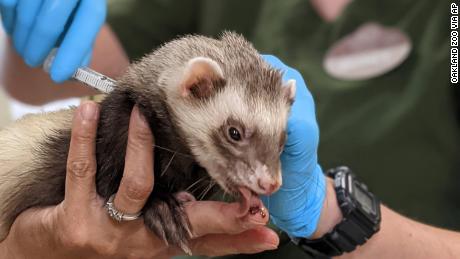(CNN)The Oakland and Denver zoos will be among the first to start vaccinating tigers, bears and other mammals susceptible to coronavirus infections with a new animal Covid-19 vaccine from animal health company Zoetis.
The vaccine requires two doses and was first administered to gorillas in the San Diego Zoo Safari Park in March after cases were confirmed in a group of the zoo's large primates.
Zoetis donated more than 11,000 doses to almost 70 zoos and wildlife sanctuaries across the country as a part of an experimental vaccination effort authorized by the US Department of Agriculture.
"This is a vaccine that was developed for animals by the Zoetis company," said Scott Larsen, head veterinarian at the Denver Zoo. "By using it in animals, it's not taking away vaccines that would otherwise be distributed to people."
At the Oakland Zoo, animal vaccinations began on June 30 and the animals are "doing great post-vaccine," said Erin Harrison, a spokeswoman for the zoo.
Zookeepers have monitored the animals after they received doses to ensure they are acting normally, Harrison said. The zoo has received enough experimental vaccines for 50 animals and each animal must receive two doses three weeks apart, she said.
Although research on Covid-19's effect on animals is limited, cases and deaths in endangered animal populations -- like an outbreak at an Indian tiger reserve that killed multiple big cats -- put them at higher risk, Larsen said. The vaccine will help protect rarer kinds of mammals, he said.
"We're concerned about the animals' overall populations and long-term survival on the planet," Larsen said. "There's been concern about wild populations of these animals, some of the last on earth, and what may happen when the virus gets into these animals. We're just trying to do the best we can."
Zoetis began tests for the animal vaccine when the first reports of a dog contracting Covid-19 emerged from Hong Kong last year, spokesperson Christina Lood said.
Many of the reported animal cases have been in mammals, including big cats, primates, ferrets and minks, often from exposure to infected caretakers, according to the US Centers for Disease Control and Prevention.
Pandemic precautions at zoos across the country protect animals, not just visitors, Larsen said.





